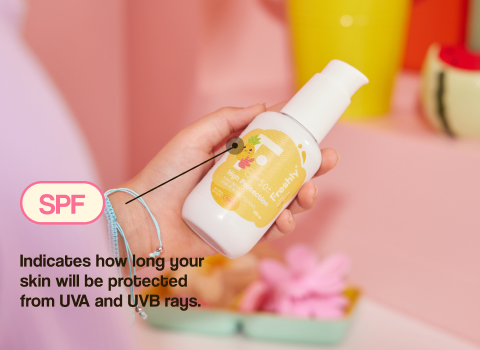SPF 50+ sunscreen for babies and kids - 50/100ml
Solar radiation and sun protection for children. All you need to know!
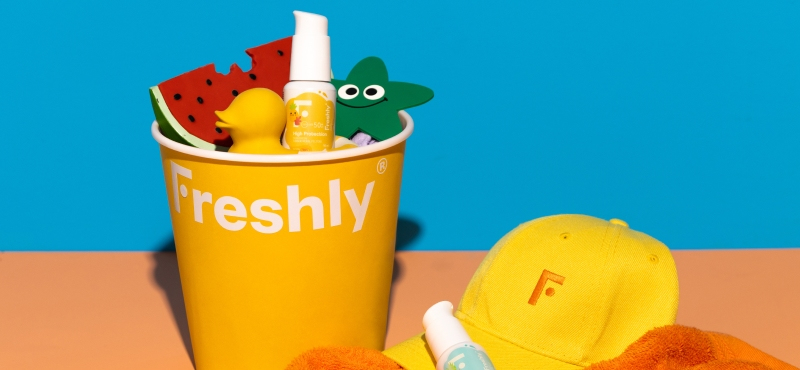
Here are your essentials
for making it this far
The sun in essential for life. It has beneficial effects on us such as the stimulation of vitamin D synthesis or the increase of hormones that regulate our well-being. But we must be aware of the dangers of solar radiation, even more so if we are talking about babies. Their skin is much more sensitive and is not prepared to protect itself from UV rays. We must take into account several aspects to enjoy the sun in a healthy way.
What are solar radiations?
The sun emits 3 different types of ultraviolet rays: UVA, UVB and UVC. Only UVA and UVB break through the ozone layer and can damage our skin:
- UVA rays penetrate to the deepest layers of our skin, such as the dermis and hypodermis. When our skin begins to tan it is actually protecting itself from these radiations.
- UVB rays, on the other hand, only affect the epidermis, the most superficial layer of our skin. These rays cause burns, redness, inflammation...
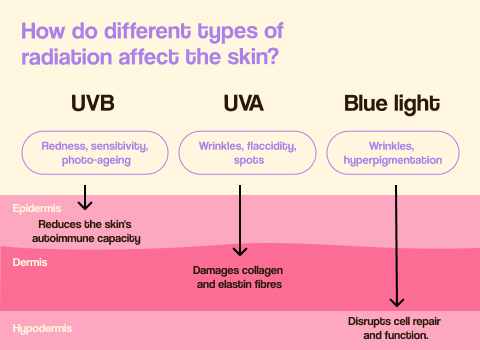
The greatest risk of these solar radiations comes from the cumulative effect of sun exposure. Over time, this effect causes a greater skin ageing. Also, serious alterations can arise in the DNA, melanomas or even cancer.
Another important aspect to take into account is that the presence and intensity of these rays varies during the day. They are more powerful and harmful between 11am and 4pm. At this time is when we should avoid as much as possible sun exposure, being even stricter in the case of newborns, babies or children.
In order to fight against solar radiation is essential to use broad spectrum solar photoprotectors. They will help to avoid burns. You cannot risk children’s health.
What’s broad spectrum protection?
A broad spectrum sunscreen provides protection for the spectrum of UVB, UVA, and IR rays, as well as visible light. As we have already mentioned, these rays have harmful effects on the skin. Due to this fact, it is important to use a sunscreen that protects effectively the skin of the little ones. This is only possible with a broad spectrum sunscreen.
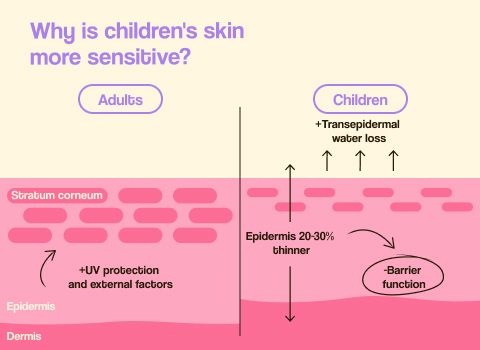
What’s the SPF?
You should be aware that a high SPF is not the same as a broad spectrum sunscreen. SPF stands for sun protection factor. This factor indicates the time during which a sunscreen increases the capacity of natural skin defence before producing burns or redness.
SPF protects the skin from the harmful effects of the sun for longer. That is to say, a SPF 15 sunscreen will multiply by 15 the time you can be exposed to sun unharmed. You should know that you won’t reach a 100% effective protection. Many factors depend on this such as your skin type, or the time of sun exposure. Therefore, it is very important to use a high SPF, such as 50 or even 50 + in the case of children. This way, you will be protecting their delicate skin for longer. This is not enough; we have to take into account more aspects.
What are the natural physical blockers? Zinc oxide and titanium dioxide
Physical blockers make solar radiations disperse. They act like a mirror on the skin's surface, like a surface layer protecting from UVB and UVA rays. They’re totally safe and healthy for babies’ bodies as they have natural ingredients and don’t penetrate the skin.
Natural zinc oxide and titanium dioxide are the most outstanding ingredients in natural sunscreens. They’re minerals from natural origin that respect the skin and the environment.
The natural minerals that protect from solar radiation
Zinc oxide is a natural mineral that has the property to act as a sunscreen, reflecting and dispersing radiation. It acts on the skin superficially as a mirror, providing an effective and healthy barrier against UVA solar rays, visible light and IR.
The same applies to titanium dioxide. It acts in the same way but in this case against the visible light, UVB and IR rays.
By combining these two natural ingredients, it is possible to achieve a safe and healthy broad spectrum protection. In addition, this formula can be applied at the very moment of sun exposure as it has natural physical blockers that act immediately.
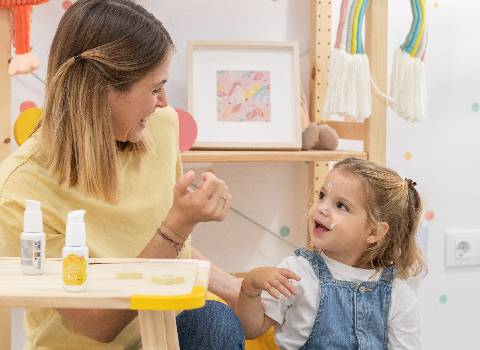
At Freshly Kids we like to give families peace of mind. This is why we created the 100% natural Kids Protection Sunscreen. It offers broad spectrum SPF 50+ protection and contains the most effective and safest natural physical filters to fight UVA and UVB rays in a healthy way.
This formula has the best of nature, so mums and dads will be able to protect the little ones from harmful solar radiation effectively and healthily. What are you waiting for? Click here and discover all its benefits. And remember, comment and share how you protect your kids from solar radiation...we like to know your tips and tricks.
Leave a comment on this post or on our Blog, and share your impressions and your Freshly Experience with us. Your opinion is very important! Come back soon to our blog, new content comes every week.
Freshly wants to tell you something! At Freshly we keep on learning every day how to make decisions that bring us closer to a better future. Sometimes we are called dreamers, but what we really have is an optimistic vision and clear path for reaching that tomorrow.
Would you like to join this adventure? If you're here, it's because you are a demanding person when it comes to taking care of your body and the planet. By subscribing to the newsletteryou will receive articles like this one to continue learning, as well as news and exclusive discounts. Are you up for it?




